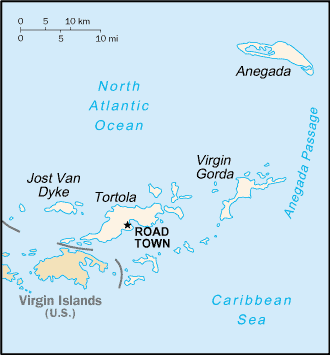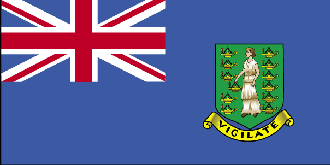
|
British Virgin Islands
Background:
First settled by the Dutch in 1648, the islands were annexed in 1672 by the
English. The economy is closely tied to the larger and more populous US Virgin
Islands to the west; the US dollar is the legal currency.
Location:
Location: Caribbean, between the Caribbean Sea and the North Atlantic Ocean,
east of Puerto Rico.
Area: Total: 153 sq km, note: comprised of 16 inhabited and more than 20
uninhabited islands; includes the island of Anegada, water: 0 sq km, land:
153 sq km.
Area - comparative: About 0.9 times the size of Washington, DC
Coastline: 80 km
Climate and Terrain:
Climate: Subtropical; humid; temperatures moderated by trade winds.
Terrain: Coral islands relatively flat; volcanic islands steep, hilly.
Geography - note: Strong ties to nearby US Virgin Islands and Puerto Rico.
People:
Population: 21,730.
Ethnic groups: Black 83%, white, Indian, Asian and mixed.
Religions: Protestant 86% (Methodist 33%, Anglican 17%, Church of God 9%,
Seventh-Day Adventist 6%, Baptist 4%, Jehovah's Witnesses 2%, other 15%), Roman
Catholic 10%, none 2%, other 2%.
Languages: English (official).
Government:
Dependency status: Overseas territory of the UK; internal self-governing.
Capital: Road Town.
Economy overview:
The economy, one of the most stable and prosperous in the Caribbean, is highly
dependent on tourism, generating an estimated 45% of the national income. An
estimated 350,000 tourists, mainly from the US, visited the islands in 1998.
Tourism suffered in 2002 because of the lackluster US economy. In the
mid-1980s, the government began offering offshore registration to companies
wishing to incorporate in the islands, and incorporation fees now generate
substantial revenues. Roughly 400,000 companies were on the offshore registry
by yearend 2000. The adoption of a blanket of confidentiality with regulated
statutory gateways for investigation of criminal offenses is expected to make
the British Virgin Islands even more attractive to international business.
Livestock raising is the most important agricultural activity; poor soils limit
the islands' ability to meet domestic food requirements. Because of
traditionally close links with the US Virgin Islands, the British Virgin
Islands has used the dollar as its currency since 1959.
Statistics:
Telephones - main lines in use: 10,000.
Radio broadcast stations: AM 1, FM 4.
Radios: 9,000.
Television broadcast stations: 1 (plus one cable company).
Televisions: 4,000.
Railways: 0 km
Highways: Total: 177 km paved:
Airports - with paved runways: 2,
with unpaved runways: 1.
Return to Visiting Locations
|

